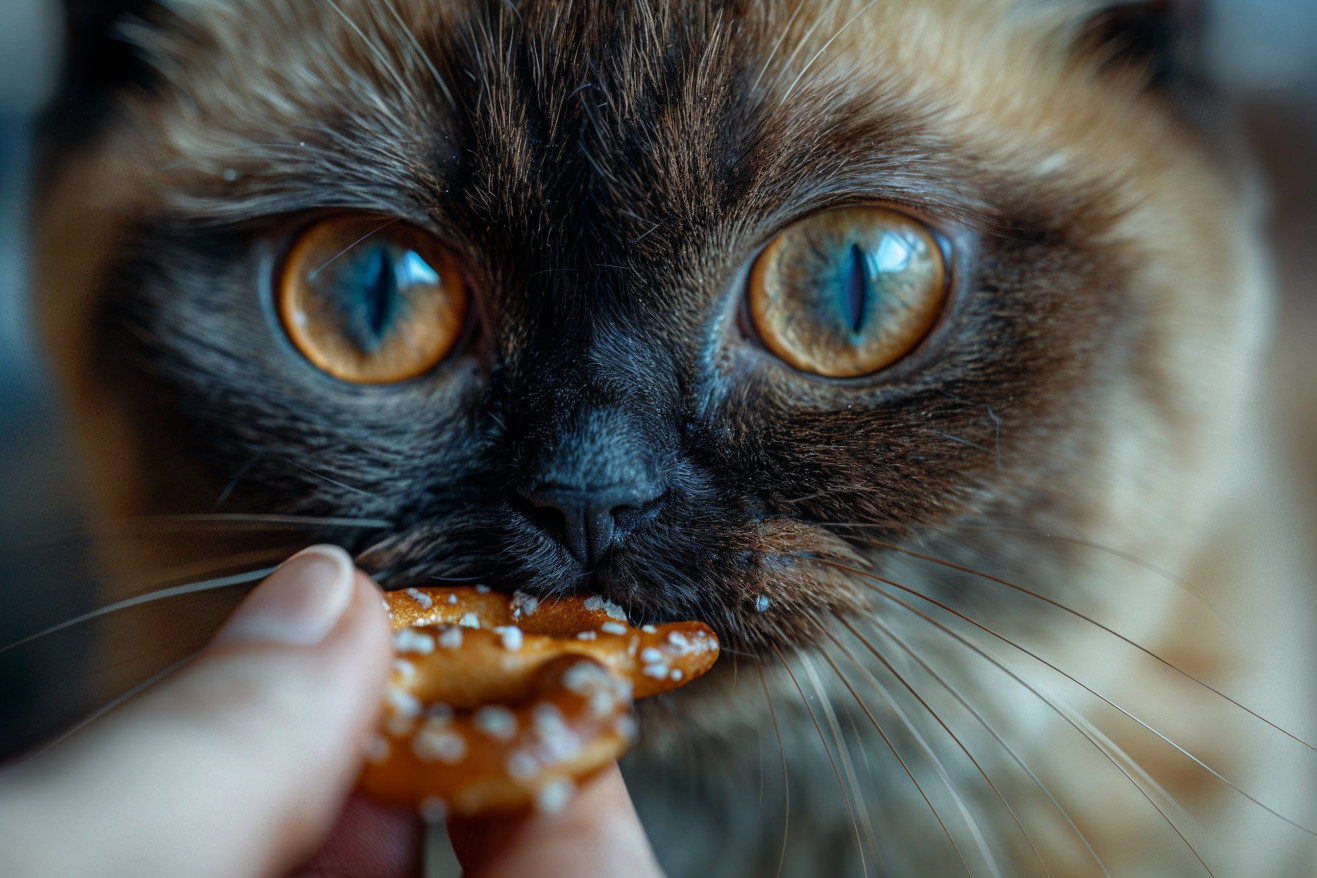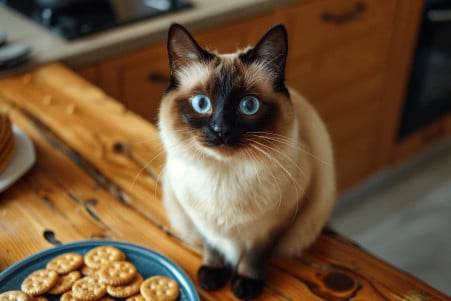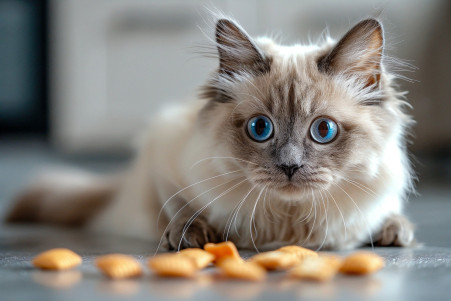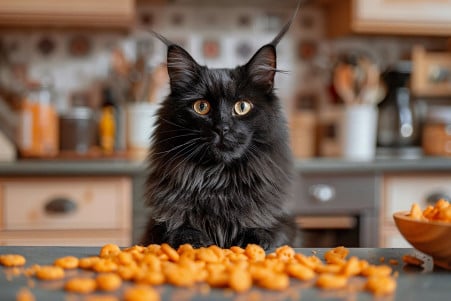Can Cats Have Pretzels? Here's What a Veterinary Nutritionist Says
11 April 2024 • Updated 11 April 2024

If you’ve ever found yourself snacking on pretzels and your cat comes up to you, you may have asked yourself if it’s okay to share your snack with your pet. While cats can have pretzels in moderation, they should not be a staple in your cat’s diet for a few reasons. First, pretzels don’t offer any nutritional benefits for cats. Second, they may contain ingredients that are toxic to cats or that cats can’t digest.
In this article, we’ll explore the findings of veterinary nutritionists who have researched the effects of pretzels on cats. By looking at the results of studies that have investigated how cats react to some of the most common ingredients in pretzels, including refined grains, salt, and preservatives, we’ll give you the information you need to decide whether or not to let your cat enjoy this treat with you.
Can cats eat pretzels?
Health Risks of Giving Cats Pretzels
There are several health risks associated with giving pretzels to cats, and it's important for responsible pet owners to be aware of them. For one, as Animal Gator explains, the high salt content in pretzels can lead to dehydration, electrolyte imbalances, and even sodium ion poisoning in cats. In addition, pretzels don't provide the high-protein, meat-based nutrition that cats need as obligate carnivores.
On the other hand, pretzels are high in carbohydrates and calories due to their refined grains and sugars, and if cats eat too many, it can lead to obesity, which is the opposite of what a cat's diet should be. In addition, some of the most common ingredients in pretzels, including garlic, onion, and certain seasonings, can be harmful to cats, leading to gastrointestinal upset, vomiting, diarrhea, and a loss of appetite.
Cats with certain health conditions, such as diabetes, kidney disease, and food allergies, are at an even greater risk if they eat pretzels. In addition, according to PetMD, kittens and senior cats are more likely to experience more severe side effects from eating pretzels due to their age and changing nutritional requirements. In general, while a small bite of a pretzel here and there may not cause any issues for a healthy adult cat, it's best to avoid giving them to your cat to ensure their health and safety.
Pretzel Ingredients and Potential Allergic Reactions in Cats
Cats can be allergic to many of the common ingredients in pretzels, including wheat flour, dairy, and spices or seasonings, says VCA Animal Hospitals. Signs of a food allergy in cats can include skin problems, itching, gastrointestinal upset, and respiratory issues. PetMD explains that food allergies are uncommon in cats, affecting about 1% of the cat population, although they may be present in up to 15% of cats with itchy skin.
Food allergies are diagnosed through a veterinarian-supervised elimination diet trial and are treated by avoiding the allergen and feeding a hypoallergenic or novel protein diet. Cats can develop an allergy to a food they've eaten in the past, so even if your cat has eaten pretzels before without any problems, it's important to watch for signs of an allergic reaction.
Why Is Raw Pretzel Dough Bad for Cats?
The biggest danger of raw pretzel dough for cats is the yeast and fermentation. When cats eat the dough, the yeast in their stomachs causes the dough to rise. This produces ethanol gas, which can lead to bloat, stomach torsion, and alcohol poisoning in cats, according to JustAnswer and Cooper Pet Care. Signs of dough ingestion can include vomiting, lethargy, disorientation, and bloating.
Cats don't have to eat a lot of raw pretzel dough to be at risk, and the danger is even greater for kittens and smaller cats. According to Pet Poison Helpline, the dough can expand in the warm, moist environment of the cat's stomach, leading to gastric-dilatation volvulus (GDV) or bloat. If your cat eats raw pretzel dough, it's important to get them to a vet right away to avoid potentially fatal complications.
Healthier Alternatives to Feeding Cats Pretzels
Instead of pretzels, pet parents should consider feeding their cats treats that are specifically made for cats and are free from potentially dangerous ingredients. Shameless Pets offers natural, high-quality cat treats that are made with real meat and seafood as the first ingredient. These low-calorie, high-protein treats can be a much healthier alternative to pretzels.
Some pet brands even make cat treats that are pretzel-shaped or flavored, but it's important to research their safety and nutritional value. AskMyCats notes that low-calorie or probiotic pretzels may be a better option. Fresh, cooked meats or fish can also be used as a protein-rich treat for cats on occasion.
In general, treats should make up no more than 10% of a cat's daily caloric intake, with the rest of their diet coming from a nutritionally complete, commercial cat food, as AskMetaFilter points out. By feeding cats treats that are safe and nutritious in moderation, pet parents can ensure that they meet their cats' needs for variety without compromising their health.
Conclusion: Pretzels Should Be Fed to Cats in Moderation
While pretzels are not poisonous to cats, they should be fed to cats in moderation and only as an occasional treat due to their lack of nutritional value and potential health concerns. Cats with health issues, including allergies, and cats in certain life stages (kittens, seniors, pregnant/nursing cats) should not eat pretzels.
If you do feed your cat pretzels, make sure they are plain and unsalted and watch for any signs of an allergic reaction or gastrointestinal upset. Make sure your cat's primary diet is a well-balanced, nutritionally complete cat food, and that treats account for no more than 10% of your cat's daily caloric intake. Talk to your vet to get personalized recommendations for safe and healthy treats for your cat.


